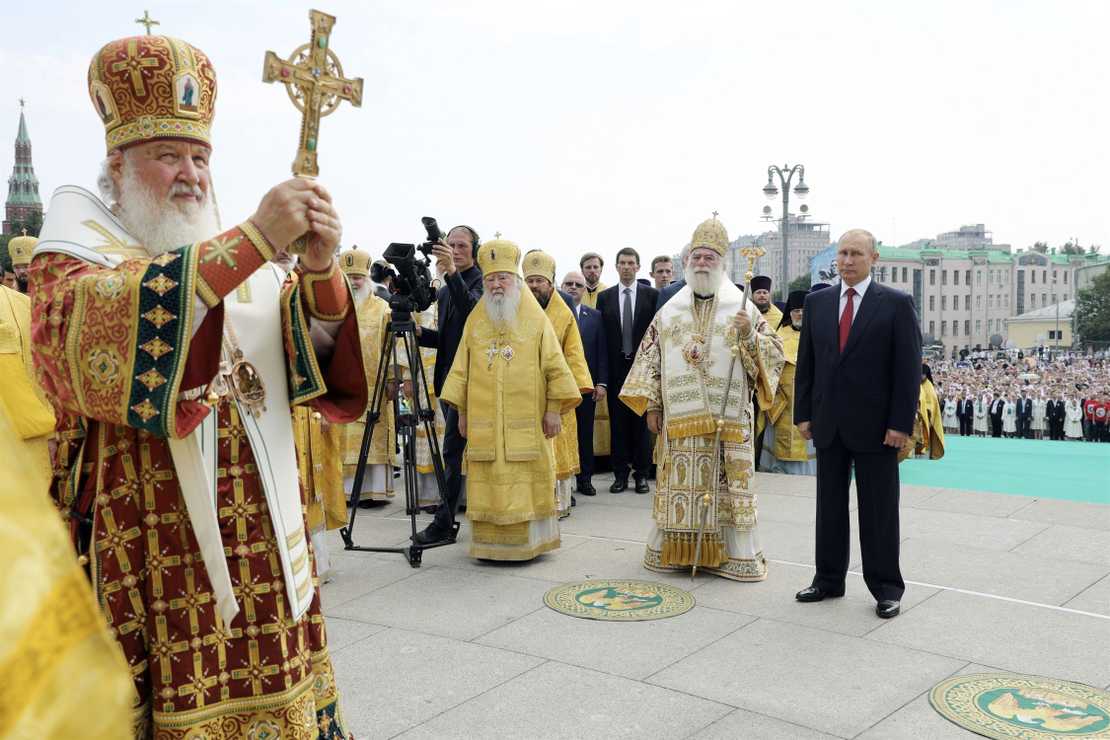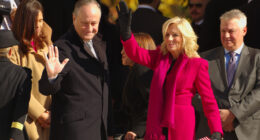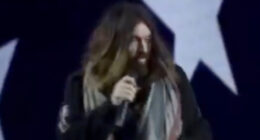
Will a pointed removal of a prayer undo Vladimir Putin? An important piece of the Russian tyrant’s domestic propaganda strategy may have started to collapse — the churches. The head of the Russian Orthodox Church still supports Putin, but 176 of his clerics now have publicly declared their opposition to the war (via Fr. Marcel Guarnizo):
At least 176 Orthodox clerics said that they “respect the freedom of any person given to him or her by God,” adding that the people of Ukraine “must make their own choices by themselves, not at the point of assault rifles and without pressure from either West or East.” …
“We call on all opposing sides for a dialogue because there is no other alternative to violence,” the letter says. “Only an ability to hear the other side can give us hope to get out of the abyss our countries were thrown into several days ago. Let yourself and us all enter the Easter Lent in the spirit of faith and love. Stop the war.”
There was no comment or other reaction from Patriarch Kirill or from Russian officials.
The letter makes references to “judgment day” and “eternal suffering,” saying nothing on Earth can prevent that judgment.
That wasn’t just aimed at Putin, bur also at Patriarch Kirill:
It is very rare for such a large number of religious clerics of the Orthodox Church to openly challenge President Vladimir Putin’s government. In recent years, the Russian Orthodox Church and its leader, Patriarch Kirill, who did not sign the letter, have fully supported Putin’s policies.
This didn’t start with the omission of a prayer for Patriarch Kirill, to which we’ll return in a moment. It started with one of Kirill’s own prayers that endorsed Putin’s attack on Ukraine in the name of wiping out any national identity for Ukrainians:
The Orthodox Primate of Moscow and All Russians offered prayers on Sunday for the ongoing conflict in Ukraine, invoking the concept of a Russian “fatherland” inclusive of Ukraine, while insisting on the ecclesiastical authority of Moscow over Kyiv’s Church leaders.
The patriarch’s remarks have been widely seen as part of an ongoing Russian Orthodox theological justification for Russia’s military invasion of Ukraine. …
“The pledge of this [Christian] brotherhood is our united Orthodox Church, which in Ukraine is represented by the Ukrainian Orthodox Church [loyal to Moscow], headed by His Beatitude Onufry. We have been praying for them today,” Kirill said.
The Moscow patriarch went on to pray for protection of “the people who are part of the single space of the Russian Orthodox Church from internecine warfare.”
“May the Lord protect the Russian land,” Kirill prayed. “When I say ‘Russian,’ I use an ancient expression from the ‘Tale of Bygone Years’ – ‘Where did the Russian land come from?’ The land, which now includes Russia, and Ukraine, and Belarus, and other tribes and peoples. So that the Lord preserves the Russian land from external enemies, from internal discord, so that the unity of our Church is strengthened.”
READ RELATED: Baby died when doctors gave 30-week pregnant mother an abortion pill thinking she was only 12 weeks
Kirill’s intervention will likely be interpreted by many Ukrainian Christians and Church-watchers as a tacit endorsement of Putin’s justification for invading Ukraine.
That’s not exactly a tacit endorsement. Kirill used his office to regurgitate Putin’s argument for anschluss on a nearly identical basis that Adolf Hitler used on Austria and then the Sudetenland in 1938. Ukrainian Orthodox bishops, who previously recognized Kirill’s authority over them, responded by tacitly removing that recognition from their liturgies and omitting the common prayer for church leaders in their services.
Kirill got the message, and he didn’t much like it. This morning he declared the Ukrainian bishops in “schism”:
“The termination of the commemoration of the Primate of the Church, not because of doctrinal or canonical errors, or delusions, but because of discordance with certain political views and preferences, is a schism, for which anyone who commits it will answer before God, not only in the age to come, but also in the present,” Patriarch Kirill of Moscow wrote March 2 to an archbishop of the Ukrainian Orthodox Church, which is governed by Kirill.
The statement came after Metropolitan Archbishop Evlogy of Sumy, a city in eastern Ukraine, instructed his priests Monday to discontinue prayers of communion with Kirill in the Divine Liturgy, or celebration of the Eucharist.
Schism is the refusal of submission to the authority of a legitimate religious authority, or refusal of communion, or unity, within a church body.
Evlogy’s decision is understood to be a repudiation of Kirill’s leadership. It came after the Russian Orthodox patriarch issued prayers Sunday that seemed aimed at theologically justifying Russian President Vladimir Putin’s invasion of Ukraine.
There’s a schism, all right, but it’s not on the part of the Ukrainian bishops or Russian clerics. The schism is Kirill’s ultimate choice of the ancient Christian dilemma for those in power — to serve God or Mammon. Kirill has chosen poorly, and now it’s not just the Ukrainians who have had enough of his sell-out to Putin.
As I mentioned at first, this could bode very ill for Putin, who’s already struggling to keep the truth about his insane war from Russians. If the clerics start talking about the war from their pulpits and contradict Kirill, that will make it exponentially harder for Putin to shape the domestic propaganda battlefield. A revolt within the Russian Orthodox Church that weakens or takes down Kirill could only be seen as a revolt against Putin himself; certainly Putin will see it that way, and his first impulse would be to suppress the church. That would accelerate dissent within Russia and stoke fears that the former KGB colonel would return Russians to the same godless Soviet doctrines that they thought were long behind them. And it might even convince some of Putin’s jocksniffers outside Russia once and for all that Putin’s not a fidei defensor of Christianity, but instead someone who’s played gullible Christians while aspiring to tsar-like status.
In that sense … faster, please.
Father Marcel Guarnizo talked with me at length on my most recent podcast about the corruption of Kirill and the then-silence of his bishops and clerics. Here’s the YouTube version of it, but go to the link above if you’d prefer it on Spotify or Apple Podcasts.
[embedded content]
Update: It’s 176 clerics, not bishops — mainly priests and monks. I’ve corrected the headline and the text. My apologies for the error, and thanks to John Schindler for bringing it to my attention.
Source:






